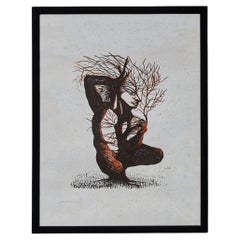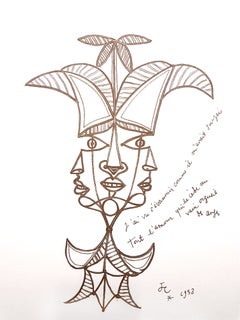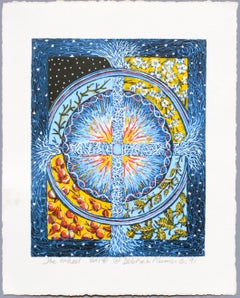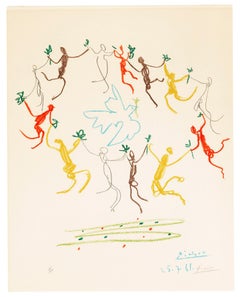Items Similar to Wheel of Life : To the Future - Lithograph, Ltd 100 copies
Want more images or videos?
Request additional images or videos from the seller
1 of 10
Jean MaraisWheel of Life : To the Future - Lithograph, Ltd 100 copies
$240.84
£178.19
€200
CA$333
A$365.59
CHF 190.73
MX$4,424.18
NOK 2,390.51
SEK 2,252.49
DKK 1,522.81
About the Item
Jean Marais (1913 - 1998)
Wheel of Life : To the Future
Original lithograph
Signed with the stamp of the artist
(Also bears printed signature in the plate)
Numbered / 100 copies
On Arches vellum 65 x 50 cm (c. 26 x 20 inch)
Excellent condition
Jean Marais is a famous french artist and actor, friend of Jean Cocteau and Pablo Picasso. His artworks were exhibited in the museum of Vallauris (now closed) ; this lithograph comes from the museum / artist estate.
- Creator:Jean Marais (1913 - 1998)
- Dimensions:Height: 25.6 in (65 cm)Width: 19.69 in (50 cm)
- Medium:
- Movement & Style:
- Period:
- Condition:
- Gallery Location:Paris, FR
- Reference Number:1stDibs: LU46438820592
About the Seller
4.9
Platinum Seller
Premium sellers with a 4.7+ rating and 24-hour response times
Established in 2010
1stDibs seller since 2016
3,733 sales on 1stDibs
Typical response time: <1 hour
- ShippingRetrieving quote...Shipping from: Paris, France
- Return Policy
Authenticity Guarantee
In the unlikely event there’s an issue with an item’s authenticity, contact us within 1 year for a full refund. DetailsMoney-Back Guarantee
If your item is not as described, is damaged in transit, or does not arrive, contact us within 7 days for a full refund. Details24-Hour Cancellation
You have a 24-hour grace period in which to reconsider your purchase, with no questions asked.Vetted Professional Sellers
Our world-class sellers must adhere to strict standards for service and quality, maintaining the integrity of our listings.Price-Match Guarantee
If you find that a seller listed the same item for a lower price elsewhere, we’ll match it.Trusted Global Delivery
Our best-in-class carrier network provides specialized shipping options worldwide, including custom delivery.More From This Seller
View AllAstrology and Zodiac : Aries - Lithograph, Ltd 100 copies
Located in Paris, IDF
Jean Marais (1913 - 1998)
Astrology and Zodiac : Aries
Original lithograph
Signed with the stamp of the artist
(Also bears printed signature in the plate)
Numbered / 100 copies
On v...
Category
Late 20th Century Modern Animal Prints
Materials
Lithograph
$210 Sale Price
30% Off
The Wheel (Mois de l'Estampe) - Vintage Lithograph Poster, 2001
Located in Paris, IDF
Pierre ALECHINSKY
The Wheel (Mois de l'Estampe), 2001
Original Lithograph (Clot, Bramsen & Georges workshop)
Printed signature in the plate
On paper 86 x 59 cm (c. 34 x 24 inch)
Cre...
Category
Early 2000s Abstract Abstract Prints
Materials
Lithograph, Offset
Astrology & Zodiac : Aries "Impulses of the Heart" - Lithograph, Ltd 100 copies
Located in Paris, IDF
Jean Marais (1913 - 1998)
Astrology & Zodiac : Aries "Impulses of the Heart"
Original lithograph and photolithograph
Signed with the stamp of the artist
(Also bears printed signatu...
Category
Late 20th Century Modern Animal Prints
Materials
Lithograph
Astrology and Zodiac : Taurus - Lithograph, Ltd 100 copies
Located in Paris, IDF
Jean Marais (1913 - 1998)
Astrology and Zodiac : Taurus
Original lithograph
Signed with the stamp of the artist
(Also bears printed signature in the plate)
Numbered / 100 copies
On ...
Category
Late 20th Century Modern Animal Prints
Materials
Lithograph
Horses - Lithograph, Ltd 100 copies
Located in Paris, IDF
Jean Marais (1913 - 1998)
Horses
Original lithograph
Signed with the stamp of the artist
(Also bears printed signature in the plate)
Numbered / 100 copies
On vellum 50 x 65 cm (c. ...
Category
Late 20th Century Modern Animal Prints
Materials
Lithograph
Surrealist Mecanism (Cycle) - Original lithograph, Signed
Located in Paris, IDF
Jules Perahim (1914-2008)
Surrealist Mecanism (Cycle), 1974
Original lithograph
Signed in pencil by the artist
Numbered / 199
On Arches vellum 56 x 38 cm (c. 22 x 15 inches)
INFORM...
Category
1970s Surrealist Figurative Prints
Materials
Lithograph
You May Also Like
Jean Marais Lithographie At Cost Price
By Jean Marais
Located in Saint-Ouen (PARIS), FR
Vintage lithography, numbered and signed by the french artist Jean Marais (1913-1998)
Category
Vintage 1960s French Mid-Century Modern Contemporary Art
Materials
Wood, Paper
Jean Cocteau - Three Persons or One - Original Lithograph
By Jean Cocteau
Located in Collonge Bellerive, Geneve, CH
Original Lithograph by Jean Cocteau
Title: Three Persons or One
Signed in the plate
Dimensions: 32 x 25.5 cm
Edition: 200
1959
Publisher: Bibliophiles Du Palais
Unnumbered as issued
Category
1950s Modern More Prints
Materials
Lithograph
"The Wheel", Multi Layer Circle Abstract Silkscreen Print
By Deborah Rumer
Located in Soquel, CA
Colorful abstract screen print of a circular composition with a seasonal theme by Deborah Rumer (American, 20th Century). Titled, numbered, signed, and dated ("The Wheel Ed140 © Debo...
Category
1990s Contemporary Abstract Prints
Materials
Paper, Ink, Screen
$380 Sale Price
20% Off
Pablo Picasso (After), 'La Ronde de la Jeunesse', Lithograph, 1961
By Pablo Picasso
Located in Pembroke Pines, FL
Artist: PABLO PICASSO (AFTER )
Title: 'La Ronde de la Jeunesse (The Youth Circle)'
Year: 1961
Published by: Combat Pour La Paix, Paris
Medium: Lithograph on wove paper
Printed by Mourlot
Edition: 200 plus EA
Size: 26 x 20 inches
Signed and numbered in pencil by the master
CERTIFICATE OF AUTHENTICITY INCLUDED
ARTWORK IS IN EXCELLENT CONDITION
Through the use of crisp vibrant colors and the fluid use of line, Picasso creates a sense of optimistic energy that is focused around the dove of peace in Pablo Picasso La Ronde de la Jeunesse...
Category
1950s Contemporary Animal Prints
Materials
Lithograph
Lithograph by Jean Cocteau, Nouvelle de l'étranger, Artist Proof, 1960-70.
By Jean Cocteau
Located in Saint-Ouen, FR
Lithograph by Jean Cocteau, Nouvelle de l'étranger, artist proof, 1960-70.
Lithograph by Jean Cocteau,1960-70, 1/10, nouvelle de l'étranger, artist proof, unframed.
h: 50cm, w: 65cm...
Category
20th Century French Mid-Century Modern Drawings
Materials
Paper
La Roue Qui Tourne 1999 Limited Edition Lithograph
By Alain Raya Sorkine
Located in Rochester Hills, MI
Artist: Raya Sorkine
Title: "La Roue Qui Tourne"
Title: Wedding in Venice
Year: 1999
Print - Lithograph on Arches Archival Paper 39'' x 29.5''
Edition: signed in pencil and number...
Category
1990s Fauvist Figurative Prints
Materials
Lithograph
More Ways To Browse
Wheel Of Life
Jean Wheeler
Poster Aesthetic Vintage Art
Prairie Dog
Signed Duck Art Prints
Simon Bussy
Strato Lounger
Tete De Taureau
Tortoise And Hare Vintage
Ulisse Aldrovandi
Vintage Fetish Shoes
Albion Printing Press
Andy Warhol Pussy
Audubon Hawk
Audubon Puffin
Azoulay Art Horses
Banksy Greenpeace
Blue Dog Lithograph



